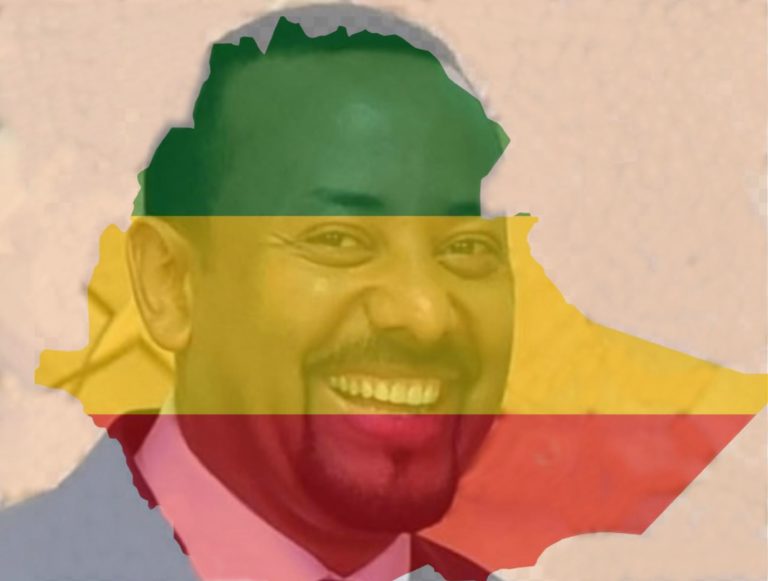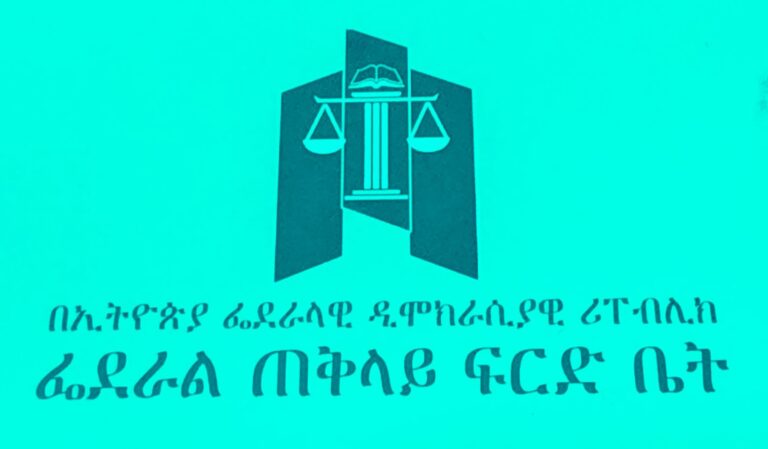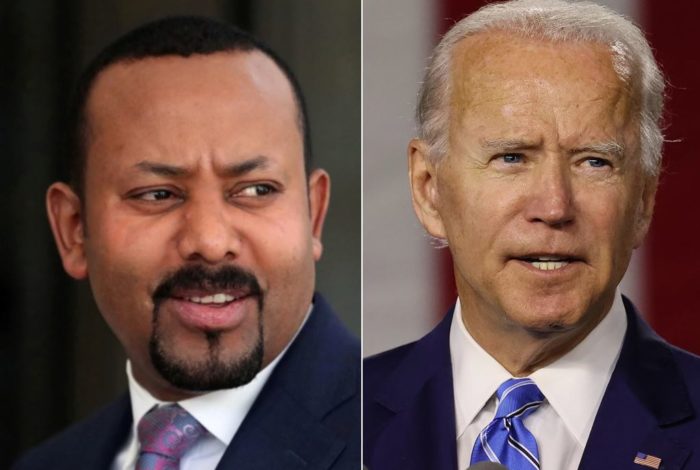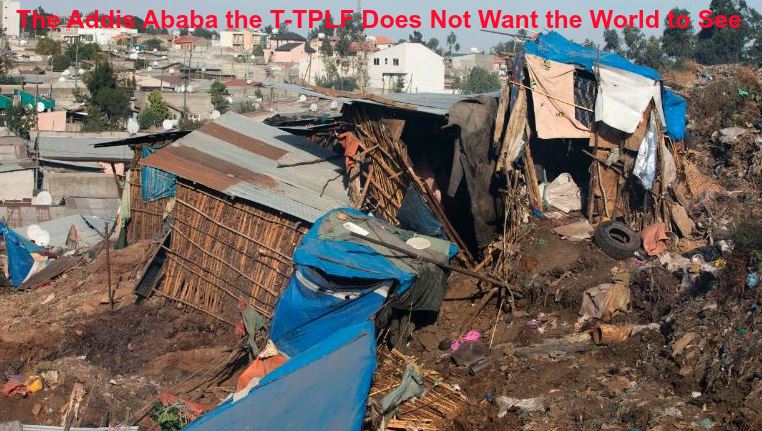Ethiopia: Broken Contract, Broken Faith, Broken Country
This post originally appeared in the Huffington Post 3/22/2011
http://www.huffingtonpost.com/alemayehu-g-mariam/ethiopia-broken-contract-_b_838793.html
Over the past week, Meles Zenawi has been waxing eloquent on contract and leasehold law. Asked by a local journalist whether the winds of change blowing in North Africa could make a detour to Ethiopia, he said that was impossible because he and his party have a five-year “contract” with the Ethiopian people. He explained,
When the people gave us a five year contract, it was based on the understanding that if the EPDRF party [Zenawi’s party] does not perform the contract to expectations it would be kicked out of power. No need for hassles. The people can judge by withholding their ballots and chase EPDRF out of power. EPDRF knows it and the people know it too. Therefore, in a situation where the people have this kind of power and have given consent to a government which has been in power for 10 months, they can wait [until the end of the five-year contract] and remove it by denying their ballots. There is no reason or logic why they would change it by other means. That is why a change similar to that in North Africa cannot happen in Ethiopia.
It is not clear what Zenawi means in his repeated use of the word “contract” to describe the relationship between the people of Ethiopia and his party, and how that “contract” became an ironclad deal for five years. The terms of the “contract” and the circumstances that constitute breach are also unclear. But the word “contract” has special significance for those in the legal profession and students of political theory.
Legal Contract?
In the civil laws of all modern societies, a contract is a legally enforceable agreement between two or more parties with mutual obligations. There are all sorts of contracts, and certain ones have no validity in law. For instance, there are “unconscionable contracts” in which one party imposes terms on the other party by duress (such as use of physical threats, economic pressure, misleading information, etc.), undue influence (one party takes unfair advantage of the weaknesses of the other party) or “unconscionable bargaining” (the party in a superior bargaining position denies the subordinate party realistic opportunities to negotiate beneficial terms leaving that party the option of only acquiescing to the deal). A contract based on an “illusory promise” is invalid because one party has the sole option to live up to the terms of the contract or to avoid the obligations at will. If Zenawi does indeed have a legal “contract” with the people, it must be of the “unconscionable” variety.
A Social Contract?
Perhaps Zenawi is referring to a “social contract” with the Ethiopian people. Jean-Jacques Rousseau, the philosophical anchor of the French Revolution theorized about a “social contract” in which individuals gave up their natural liberty to ensure their self-preservation in civil society. Rousseau penned the memorable phrase, “Man is born free, but everywhere he is in chains.” The “chains” were put on man by other men who seek domination. Rousseau’s solution to the problem of “man in chains” was to create a community of people who establish a state that expresses their sovereign “general will” by passing laws that benefit them. Rousseau believed that government has a tendency to usurp the power of the people and supported the right of the people to alter their form of government and replace their leaders at will. The question is whether the Ethiopian people are in “chains” or “free” in their “contract” with Zenawi.
John Locke, the philosophical anchor of the American Revolution, also theorized about a “social contract”. He argued that individuals collectively formed society in mutual consent to protect each other’s life, liberty and property by establishing government. He believed the “just powers” of government derive from the consent of the governed. He wrote, “Freedom of men under government is to have a standing rule to live by, common to every one of that society, and made by the legislative power vested in it; a liberty to follow my own will in all things, when the rule prescribes not, and not to be subject to the inconstant, unknown, arbitrary will of another man.” Locke’s basic argument is that people entered into a “social contract” to live under the rule of law (that is by application and respect for constitutional principles and legislation passed by the people’s representatives) and avoid the rule of a tyrant. Locke’s “social contract” is revocable at any time by the withdrawal of popular consent. The question is whether Zenawi’s vaunted “contract” with the Ethiopian people is based on the “rule of law” or the “arbitrary will of a man”?
Thomas Hobbes, the English philosopher and champion of absolutism (dictatorship) also proposed a “social contract” theory. He argued that in the state of nature (before government was established), life was “nasty, brutish, and short”. To end the “war of all against all” in the state of nature, humans entered into a “contract” and gave up their “unlimited natural freedoms” in exchange for a political community and civil society that maximized their self-preservation and personal security. Hobbes believed that a powerful and supreme sovereign (a monarch) was needed to enforce the “social contract”. Unlike Locke who believed in the rule of law, Hobbes believed in rule by prerogative (arbitrary rule by one individual who is accountable to no one) in which a monarch would exercise supreme authority to ensure the safety and security of individuals in civil society. Having personally experienced the English Civil War, he came to believe that the burdens of the most oppressive government are “scarce sensible, in respect of the miseries, and horrible calamities, that accompany a Civil War”. In other words, having an absolute dictator is better than risking civil war. Louis XIV of France was probably echoing Hobbes when he told parliamentarians challenging his personal decrees, “L’État, c’est moi.” (The state, it is me). More recently, Muammar Gaddafi and his sons have been pleading to extend their 42-year “contract” on the Libyan people indefinitely by claiming: “The tribes are all armed, there are forces from the Libyan army and the eastern region is armed. The situation is very dangerous. From the perspective of a civil war, the leader must play a very, very big role in calming Libya and convincing people to sit together. If something happened to the leader, who would be in control? A civil war would start.” Perhaps Zenawi is referring to a Hobbsean-type of social contract?
This idea of a “contract” with the people is nothing new. After winning the 1994 elections, Republican members of the U.S. House of Representatives claimed to have concluded a “Contract With America” (CWA) aimed at “restoring the bonds of trust between the people and their elected representatives.” They said they would bring an “end of government that is too big, too intrusive, and too easy with the public’s money.” They promised to eliminate deficit spending and reduce fraud, waste and abuse in government. Over the following decade, “Big Government” continued to grow bigger under the CWA. Republicans went on a spending spree incurring the biggest annual increases in spending over the preceding 40 years. They got entangled in a number of spectacular corruption cases and lobbying scandals. The three “engineers” of the 1994 “Republican Revolution” publicly broke their “bonds with the people.” In 1998, following Republican losses in the mid-term elections and paying a fine of $300,000 for ethics violations, Newt Gingrich resigned both his Speakership and his congressional seat. Dick Armey served as House majority leader before retiring in 2002. He dumped the Contract With America, joined the DLA Piper lobbying firm and snagged a contract “for a minimum of $50,000 a month” with the Zenawi regime. Tom Delay, another member of the CWA team took over from Armey but was forced to resign in 2005 after he was charged with criminal money laundering. He was convicted in 2010 and sentenced to three years in prison.
Leaseholds and Land Grabs
Zenawi also offered extended legal analysis of the “land grab” problem in Addis Ababa. The question raised by a young reporter was whether developers who held leaseholds in urban land in the capital could freely transfer their interest in the open commercial real estate market regardless of any improvements (buildings) on the land. Zenawi made the bewildering claim that “developers were grabbing land that does not belong to them in any legal sense and misusing the land lease rights they were given for personal profit and speculation.” He said such transfers were fueling “land speculation” in the capital with “government officials facilitating such activities or turning a blind eye” to them. He said the “intention” of the law “was to transfer use rights for those who can use it better” but that “the law was open to interpretation.” He proceeded to make the following astonishing statement:
The reason why we have not taken anyone to court on that basis is simply because it is open to interpretation. The political mistake is that it was open to be interpretation and therefore strictly speaking such acts may not have been illegal. They may not have been wise, but they may not be illegal. So those who made those unwise decisions, but they cannot be held accountable simply because the law provides for such interpretation. And so we will be taking steps to clarify those specific provisions in the law to make sure they did not open the floodgates for speculation in urban land. All of those, with the exception of one businessman have admitted they made very serious mistakes, offered to correct the mistakes and asked for administrative penalties rather than taking them to court. It does not serve our development interest to lock up so many businessmen since they admitted their mistakes, mend their ways and pay hefty fines. All government officials involved will be taken to court.
Zenawi’s analysis is remarkable for its manifest misconstruction of the urban land proclamation and non-sequitur (fallacious argument) explanation. First, the transfer of leasehold interest by developers in the open commercial market is a perfectly legal activity and can in no way be characterized as “land grabbing” or “land speculation.” Article 13 of Proclamation No. 272/2002 (A Proclamation to Provide for the Reenactment of Lease Holding of Urban Land) provides: “Any lease-hold possessor may transfer, or undertake a surety on, his right of lease-hold; and he may also use it as a capital contribution to the amount of the lease payment he has made.” The are no express or implied limitations in the Proclamation on the transfer of leasehold rights by anyone who has “lease-hold title” as defined in Article 9 (i.e. “any person, to whom lease-hold of urban land is permitted through auction or negotiation, after he has signed a contract of lease with the body permitting the land or the appropriate body.” Article 6 (1) (b) (1) provides that Addis Ababa’s urban land may be leased for “upto 60 years for industry” and “upto 50 years for commerce and other” activities. There is no textual basis in the Proclamation that limits the transfer of urban leasehold interests by a lawful title holder or renders such an interest invalid because the title holder has found a way to generate personal profit from it.
Second, the penalty for violation of the terms of a leasehold is termination and forfeiture (give up the land) as set forth in Article 15: “The lease-hold of urban land shall be terminated where the lease-hold possessor has failed to use the land for the prescribed activity or service within the period of time set.” It is not a crime to violate a “contract of lease”, yet Zenawi says “it does not serve our development interest to lock up so many businessmen since they admitted their mistakes”. Zenawi has no legal authority to “lock up” any businessmen for “mistakes” allegedly committed in the exercise of their contractual rights. All he can legally do is repossess the leased land following a contested court trial and seek compensation for damages, if any. To threaten businessmen to pay “hefty fines” or face “lock up” is plain extortion.
Third, Zenawi says the “law is open to interpretation.” The relevant parts of the Proclamation are plainly written and present no ambiguity that requires interpretation. But if there is a dispute over the meaning or application of a particular law or provision, it is up to the courts to make authoritative determination on what the law means. Simply stated, whether the Proclamation allows commercial transfer of leasehold interests is purely a question of law (not fact) to be decided impartially by a judge; it is not a question to be decided by executive fiat in which one person becomes the policeman, judge, jury and executioner. For Zenawi to issue authoritative legal interpretation and dispositive declarations on what he concedes to be ambiguous questions of leasehold law is not only a travesty of justice but also an unconstitutional usurpation of judicial power. (Apparently, “one businessman” has chosen to try his luck in court by refusing to pay “hefty fines”. Best of luck!) Anyone who doubts the complete absence of the rule of law in Ethiopia and entertains the fantasy that there is an independent judiciary can take hard lessons from this example.
Fourth, Zenawi says “developers were grabbing land that does not belong to them in any legal sense and misusing the land lease rights they were given for personal profit and speculation.” It hard to make sense of this statement. Nonetheless, businessmen, including developers, are in business to make profit, as much profit as they could. Few businessmen and women are in business for charity, and even fewer would remain in business if they did not make a fair profit. A leasehold is a valuable asset in its own right and can be traded for profit as a physical asset, a fact fully acknowledged in Articles 13, 4 and 5 of the Proclamation. What must be understood is the fact that legitimate developers buy land, acquire leaseholds, finance real estate deals and build projects at great risk and expense. They often take extraordinary risks in arranging financing, obtaining loans and securing necessary regulatory approvals. More often than not, they are at the “mercy” of architects, city planners, engineers, surveyors, inspectors, contractors, brokers and building materials suppliers. It is unfair and mean-spirited to paint them with a broad brush as “land grabbers” and “land speculators” who are no better than gangsters and street criminals that deserve to be “locked up.”
Real Land Grabs and Land Speculation
On the other hand, the phrases “land grabbing” and “land speculation” are perfectly applicable to other land transactions that have been taking place throughout Ethiopia over the past several years. For instance, handing over 1.8 million hectares of farmland, “equaling nearly 40 percent the total area of the principal grain-growing state of Punjab, India” to Indian “investors” for 70 years is a prime example of “land grabbing.” Turning over 250,000 hectares of land to the Saudi Star Agriculture Development Company for decades is another excellent example of “land speculation”. Selling hundreds of thousands of hectares of land in Gambella for $1 a year “lease” is a land giveaway fest of epic proportions. Doing 815 huge land deals with foreign “investors” over a three year period without transparency, institutional mechanisms for accountability, environmental impact analysis and the forced removal of local resident from ancestral lands is not only land grabbing and land speculation, it is also a gross violation of human rights. Truth be told, it is not just urban land and it is not just farmland but the whole of Ethiopia’s land that is on the chopping block!
In the American Declaration of Independence, Thomas Jefferson, inspired by Locke, wrote that when government breaks its contract and faith with the people, the people have the right to terminate the contract at will and reinstitute government that earns their consent and deserves their trust: “That whenever any form of government becomes destructive to these ends [life, liberty and the pursuit of happiness], it is the right of the people to alter or to abolish it, and to institute new government, laying its foundation on such principles and organizing its powers in such form, as to them shall seem most likely to effect their safety and happiness.” The only contract that cannot be broken is one concluded with Mephistopheles.





